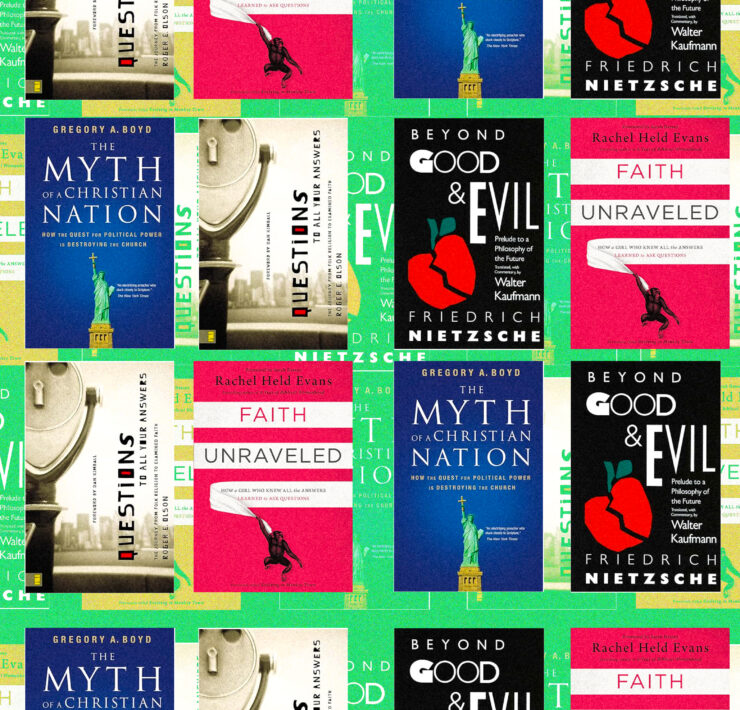“I think you can say, ‘Well, Putin’s out of his mind.’ Yes, maybe so. But at the same time, he’s being compelled by God,” said Pat Robertson, who took a break from retirement to do what Robertson does best: predict the end of the world.
“God says, ‘I’m going to put hooks in your jaws and I’m going to draw you into this battle, whether you like it or not,'” he continued. “You read your Bibles, because it’s coming to pass.”
If you’re at all familiar with American Christianity, this will sound familiar. Many prominent Christians have a bad habit of squeezing significant global events onto their own homespun model of end times theology, however poorly it all fits. Vladimir Putin’s invasion of Ukraine is ripe for this sort of religious speculation, given how malleable certain biblical prophesies are in the hands of those who want to see everything through a Left Behind-ified lens of a ticking clock. The footage and reports coming out of Ukraine have been harrowing, and we have only barely begun to feel the ripple effects both in terms of geopolitical impact and the vast human toll. But these profound matters just aren’t interesting enough for amateur end times prophets who would rather use red yarn and thumbtacks to draw galaxy brain-type lines between Putin’s machinations and the Apostle John’s visions.
Some of these Christians are sincere. Others may be more interested in greasing the palms of faithful donors. But in either case, the pattern is usually the same: cast international figures as some of the cryptic beasts, dragons and demons depicted in the Book of Revelations and use this yada, yada together some vague prediction about the end being in sight.
For many Christians, the model in question centers heavily on the Nation of Israel, and a fearsome creature or creatures known as Gog and Magog that pick a fight with it. That war kicks off a series of events culminating the return of Jesus and the establishment of a new Heaven and a new Earth.
It goes without saying that this is just one of many, many interpretations of biblical prophecy about the end of the world, but the elasticity of the particulars makes it a useful one for self-styled end times soothsayers. Over the decades, biblical figures like the antichrist and Gog and Magog have been cast as everyone from Hillary Clinton to Bill Gates to the Internet. Things got especially ugly during the Cold War, when it became popular in some conservative circles to think of the United States as a “New Israel,” which meant America’s enemies conveniently ended up being God’s enemies too.
And this is where the questionable value of speculating about which headline refers to what prophecy really makes itself plain. In recent decades, the world has endured plenty of global upheavals and humanitarian catastrophes, from nuclear bombs in Hiroshima to the civil war in Syria. This is to say nothing of recent centuries, in which enormous tragedies from the Trail of Tears to the Spanish Flu could have been interpreted by our modern day Revelations experts as a sure sign that the end was nigh.
In reality, there are plenty of places in the Bible with eschatological prophesies that scholars have debated for centuries. There’s some value in seeking to understand what Jesus, Daniel and other biblical figures were talking about in such passages. But often, these exercises become excuses to huddle in a theological bunker, waiting for fire to rain from the sky and prove us right. Instead of seeking to love and care for the victims of global conflicts, like the estimated millions of Ukrainians fleeing their homes at this very moment, we become more interested in figuring out the chapter and verse where this was all predicted. To slightly spin a phrase attributed to Oliver Wendell Holmes, Sr., some Christians become so focused on the the end times that they’re no good in the present day.
In Matthew 24, Jesus predicts “wars and rumors of wars” as the beginnings of the “birth pains,” but he also makes a note that often gets left out of contemporary interpretation of the end: “About that day or hour no one knows, not even the angels in heaven, nor the Son, but only the Father.” There is just no short cut to the end.
Whatever Jesus’ return looks like, we can neither speed it up nor slow it down by conspiracy theorizing our way through the nightly news into the Book of Ezekiel. End times prophecy is very complicated and any true scholar will readily admit that there’s a lot we don’t know about what it all means. But the Bible is extremely clear about how to treat refugees, the oppressed, the marginalized and victims of violence. If Christians are really interested in living as the Bible calls, loving others is a far better starting point than apocalyptic guesswork.
























